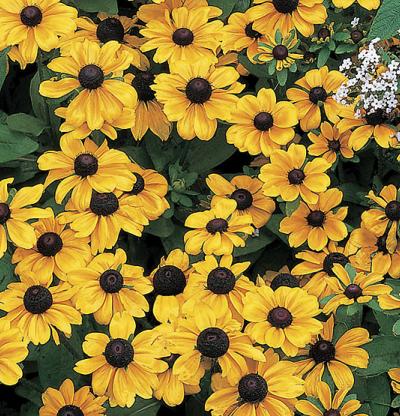





 Black-eyed Susan (Rudbeckia hirta)
rud-BEK-ee-ah HER-tah
Synonyms:
R. gloriosa
Genus:
Rudbeckia
This biennial or short-lived perennial has given rise to numerous cultivars which are often grown as annuals. From summer into early autumn, it bears daisy-like blossoms (to 3 inches across) with light or deep yellow rays and brownish-purple centers. The flowers are a staple in late summer bouquets.
Noteworthy Characteristics:
Rudbeckias hail from the moist meadows and dappled woods of North America. They are suitable for mixed borders, meadows, native gardens, open woods, and large annual displays.
Care:
Grow in average, slightly heavy but well-drained soil in full sun to partial shade.
Propagation:
Sow seeds of annuals and biennials in spring; sow perennial seeds in a cold frame in early spring, or divide plants in spring or fall.
Problems:
Aphids, powdery mildew, smut, rust, Ramularia and Septoria leaf spots, snails, slugs.
Black-eyed Susan (Rudbeckia hirta)
rud-BEK-ee-ah HER-tah
Synonyms:
R. gloriosa
Genus:
Rudbeckia
This biennial or short-lived perennial has given rise to numerous cultivars which are often grown as annuals. From summer into early autumn, it bears daisy-like blossoms (to 3 inches across) with light or deep yellow rays and brownish-purple centers. The flowers are a staple in late summer bouquets.
Noteworthy Characteristics:
Rudbeckias hail from the moist meadows and dappled woods of North America. They are suitable for mixed borders, meadows, native gardens, open woods, and large annual displays.
Care:
Grow in average, slightly heavy but well-drained soil in full sun to partial shade.
Propagation:
Sow seeds of annuals and biennials in spring; sow perennial seeds in a cold frame in early spring, or divide plants in spring or fall.
Problems:
Aphids, powdery mildew, smut, rust, Ramularia and Septoria leaf spots, snails, slugs.
Copyright © www.100flowers.win Botanic Garden All Rights Reserved